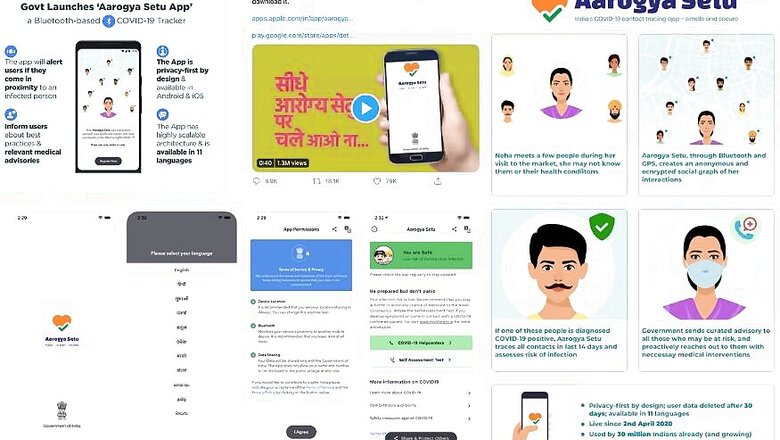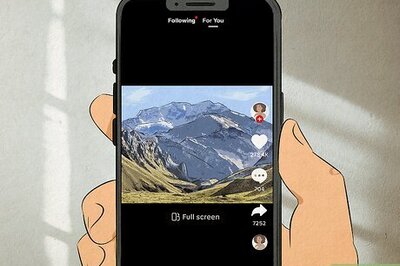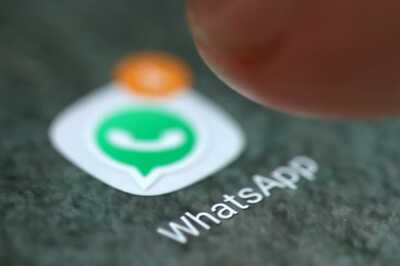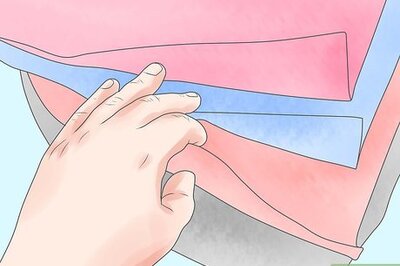
views
The Aarogya Setu app has been downloaded more than 10,000,000 by Android users from the Google Play Store. It remains at the very top of the popularity listings on the Play Store as well as Apple’s own App Store for the iPhone family of smartphones. Banks are sending SMSes urging you to download and install the Aarogya Setu app on your phones. Your mobile service provider is doing the same. The Department of Telecom is sending messages. The Ministry of Health and Family Welfare of the Government of India is sending messages too. You just cannot miss the existence of the Aarogya Setu app. Your child's school may have also sent a communication urging the entire family to sign ups for the Aarogya Setu app. That is before you even get to Twitter. But why is it such a big deal and why is it being pushed so aggressively?
The biggest push perhaps came over the weekend, when Prime Minister Narendra Modi referred to the Aarogya Setu app and said there is a possibility that the app could subsequently be used as an e-pass to facilitate travel from one place to another. One would believe this could be a reference to enabling essential travel as the lockdown continues in India, particularly for urgent or essential movement of people.
How the Aarogya Setu app started out
Let us take a look at the very reason why Aarogya Setu app came into existence. It was designed as a Coronavirus, or COVID-19 contact tracing app that uses the Bluetooth and location tracking technology in phones to note when they are near another user who also has the Aarogya Setu app installed on their phones—and this is consistently happening. This data is then matched and kept, and in case someone you have come in close proximity to is confirmed as infected by the Coronavirus, the health authorities will alert you to get yourself checked.
“In my understanding, Aaroga Setu app is trying to accomplish two roles - one, is to enforce social distancing using Bluetooth-enabled app-installed devices coming in proximity of each other; and two, a post-facto contact tracing (over say, the last one week or event-based like his departure or arrival from an infected region) if a person is identified COVID-19 positive. In addition, may be used as an COVID-19 information App,” says Prof Rajan K S, Head of Lab for Spatial Informatics at IIIT Hyderabad, or International Institute of Information Technology Hyderabad.
Contact tracing is critical in curbing the Coronavirus spread around the country and indeed around the world. A person who may be infected with the COVID-19 virus may not show any signs or symptoms for as many as 14 days more but can spread the infection in the meantime through cough, for instance. As and when a confirmed COVID case is taken in for treatment, health authorities scramble to track as many people this infected person may have met in the past few days.
Apart from potential contact tracing, the Aarogya Setu app does what one would expect in times like these—inform users about the best hygiene, protection and cleanliness practices to protect against the Coronavirus. “The data generated from the app could play a key role in the post lockdown strategy of the government. Understanding the hotspots, movements of people can provide swift, data driven policy interventions that could save us precious time, and help us recover better and faster as a country,” says Kazim Rizvi, Founder, The Dialogue, an independent policy think tank.
Aarogya Setu is an important step in our fight against COVID-19. By leveraging technology, it provides important information. As more and more people use it, it’s effectiveness will increase. I urge you all to download it.https://t.co/VaiPIjhxM2https://t.co/8Irj6ApmOQ pic.twitter.com/L91vaLlCCq— Narendra Modi (@narendramodi) April 8, 2020
The government is confident, though
That is perhaps to be expected. And a part of that surely comes from the fact that Aarogya Setu is popular among smartphone users in India. The Play Store and App Store data surely suggests as much. And parallels are being drawn with the partnership that tech giants Apple and Google announced a few days ago, which confirmed that the two companies are working on integrating tech for contact tracing apps to work better on their phones.
“India leads the way in contact tracing for COVID-19: privacy-first by design, secure, robust and scalable to billion users. Glad to see Apple and Google joining hands to develop contact tracing on the lines of #AarogyaSetu,” said Amitabh Kant, CEO, Niti Ayog on Twitter.
The World Bank has also praised the Aarogya Setu app. “Digital technologies can also be used to monitor the spread of Covid-19. Such initiatives, largely voluntary, have been successful in helping combat the pandemic in East Asia. Incentives also can be provided to those who report symptoms. India recently launched an app, Aarogya Setu, that uses location data from persons’ smartphones to tell users if they have been near someone who tested positive for Covid-19,” says the World Bank’s latest South Economic Focus report.
India leads the way in contact tracing for COVID-19: privacy-first by design, secure, robust and scalable to billion users. Glad to see Apple and Google joining hands to develop contact tracing on the lines of #AarogyaSetu @tim_cook @sundarpichai pic.twitter.com/JDoSl0A5Qa— Amitabh Kant (@amitabhk87) April 11, 2020
There are concerns about the privacy policy
Head over to the Google Play Store on your Android phone or the App Store on your Apple iPhone, and the application download page of the Aarogya Setu app welcomes you with a rather vague description of what it can and cannot do. The description reads—Aarogya Setu is a mobile application developed by the Government of India to connect essential health services with the people of India in our combined fight against COVID-19. The App is aimed at augmenting the initiatives of the Government of India, particularly the Department of Health, in proactively reaching out to and informing the users of the app regarding risks, best practices and relevant advisories pertaining to the containment of COVID-19.
Make of it what you will, but it doesn’t talk about the potential use of tracking technologies, what data is being collected, where the data is being stored, how secure is the data and what the government intends to do with the data. All this is before the user downloads the Aarogya Setu app. You need to download the app to delve a bit deeper into the Privacy Policy, which reveals a bit more.
“This App uses Artificial Intelligence, Algorithms, GPS and Bluetooth technology to identify a user’s interaction with other people. The Privacy Policy of the app itself states that it can be used by the Government for “the purpose of generating reports, heat maps, and other statistical visualizations for the purpose of the management of COVID-19 in the country”,” says Virag Gupta, Cyber Law expert and Supreme Court Advocate. Gupta also points out that worryingly, India still doesn’t have a Personal Privacy Law which would set down guidelines for how data is collected and stored as well as safeguard against the misuse of the collected data. “This App is said to have been developed in 3 weeks, but the government failed to legislate a Privacy Law despite the Puttaswamy judgment given by nine judges of the Supreme Court, many years back. As per existing IT Act and rules, health records are classified as sensitive personal data and need to be secured with the highest level of protection,” he says. There is no clarity on this particular clause in the Privacy Policy—“personal information may also be shared with such other necessary and relevant persons as may be required in order to carry out necessary medical and administrative interventions.” We do not know who these third parties might be, whether only government agencies will have access to this data or whether it may be shared with private entities too.
“The Privacy Policy says that this one-time data is stored on the server/cloud, anonymized and a unique ID generated (DiD), which is then used for all the transactions. Two other points to note are that the data is stored on the device till the user is identified as positive; and that data older than 30 days are purged both on the device and on the cloud, if any,” says Prof Rajan K S.
And genuine concerns about social stigma
Prof Rajan K S does point out the possibility of stigmatization, signs of which we are already seeing in the instances of harassment of doctors and health workers. “Personal privacy point of view, what is disturbing is the open-ended wording on sharing the personal data (once identified as positive) with other necessary and relevant persons. And how these persons or agencies will use them. Any stigmatization of individuals publicly may infringe on individual rights and needs to be guarded,” he says.
Is it more than just a contact tracing app and is it here to stay?
There is a definite opinion that we will not see the back of the Aarogya Setu app once the world is a better place and the Coronavirus is gone. The PM’s hints at this being used to facilitate travel during the lockdown could also be an indication at a much wider scope for the app, in the post-COVID world.
“This creeping expansion of uses is unsurprising, especially when the official purpose described on the App Store has been notoriously vague. Also, the government’s 3rd April Circular already revealed that the government was moving towards a centralized “Citizen App” that would be used for a range of COVID-19 related purposes,” says Amba Kak, Director (Global Strategy & Programs) at the AI Now Institute at the New York University. The circular that Kak is referring to talks about creating a single nation-wide technology platform for on-boarding all citizens—the timely peg being it will be a powerful tool in fighting a pandemic. The 7-member committee includes Chairman of TRAI R.S. Sharma, Mahindra & Mahindra chairman Anand Mahindra and N. Chandrasekaran, the chairman of Tata Sons.
Anivar Aravind, the Founder Executive Director of Indic Project believes that the latest push as a travel facilitator comes because the previous attempts to popularize this app didn’t really do the job. “Since pushing their solution to states is failed, now we are seeing integrating same idea of e-passes for data capture for limited mobility scenario due to #covid19 via Arogya Setu, using PMO, Niti Ayog access,” he says in a tweet. He also says that, “Travel industry solutionism for smartphone users is now getting integrated with e-passes for travel during health emergencies violating both citizens’ rights and federal structure,” and says that we should expect more identity integrations and also more protocol integrations for limited mobility.
Aarogya Setu and WeChat in China: Are there any similarities?
Are there any parallels with how China uses apps including WeChat to enable the access to multiple services, including travel permissions? The Chinese government has used the WeChat app as well for colour coded health tags to all citizens, which allowed authorities to enable movement and access to services as and when required. “China is using colour coding patterns to identify individuals and their proximity to a COVID affected area. WeChat also has features where users have to input their temperature at certain times during the day. This App presently requires name, gender, age, profession and travel history. As it uses Bluetooth and location data, it can surely become a facilitator for travel in the post COVID world,” says Gupta. “We’ve seen similar mobility applications in China. Various “health code” apps have been developed by local authorities where an algorithm gives users a color code (green or red) based on a questionnaire and location tracking. This decides whether you can enter your workplace, or leave city and state borders,” says Kak.
The specific concerns of Aarogya Setu, particularly as a travel facilitator, is causing more privacy queries. “People's lives can be at the mercy of non-transparent systems that don't allow you to understand, let alone question, their decisions. In China, there have been reports of complaints that people’s health code apps are flipping between green and red with no explanation. A false positive in this app can impact your ability to work, earn a living, or care for family,” warns Kak.
Rizvi believes that the Aarogya Setu app will not be used like how WeChat is used in China, simply because India is a democratic country governed by rule of law. “The right to Privacy has been enshrined as a fundamental right after the Puttaswamy judgement. The judgement lays down the principles of proportionality and necessity as conditions precedent for processing of data. We may argue that the pandemic is one of those situations where community interests are a priority. That being said, this does not waive the fundamental right to privacy,” he says.
The matter of consent and the challenges in times of a pandemic
Contact tracing apps are being used in many countries already, including China, Singapore and Vietnam, to name a few. Those who don’t have it are quickly working on getting one ready. “We are seeing globally, and not just with India, that contact tracing technologies are a work in progress when it comes to overcoming the challenges associated with obtaining true consent from the user, says Rizvi. “In an unprecedented time like this, drastic steps are vital to protect the community at large and the government has a legitimate right to conduct targeted surveillance to fight the pandemic, with proper checks and balances,” he adds.
The numbers, either way, are mind boggling. According to market research firm techARC, India has already crossed the 502.2 million smartphone user mark as of December 2019, a number that has seen a significant boost in the past few years because of more affordable smartphones arriving in stores, as well as faster 4G data prices reducing significantly. There are reports that the Aarogya Setu app will also be rolled out for feature phones, which helps widen the potential user demographic significantly.

















Comments
0 comment